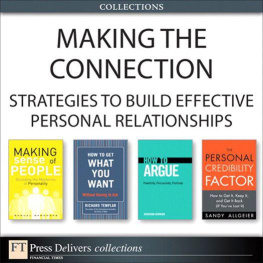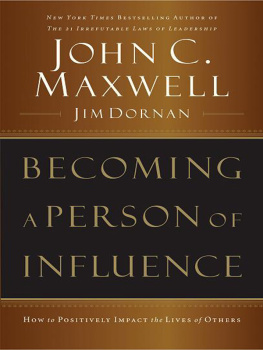How to Argue
Powerfully, Persuasively, Positively
Jonathan Herring
Vice President, Publisher: Tim Moore
Associate Publisher and Director of Marketing: Amy Neidlinger
Acquisitions Editor: Megan Graue
Editorial Assistant: Pamela Boland
Operations Specialist: Jodi Kemper
Cover Designer: Alan Clements
Managing Editor: Kristy Hart
Project Editor: Betsy Harris
Proofreader: Williams Woods Publishing
Compositor: Bronkella Publishing
Manufacturing Buyer: Dan Uhrig
2012 by Jonathan Herring
Published by Pearson Education, Inc.
Publishing as FT Press
Upper Saddle River, New Jersey 07458
Authorized adaptation from the original UK edition, entitled How to Argue by Jonathan Herring, published by Pearson Education Limited, Jonathan Herring 2011.
This U.S. adaptation is published by Pearson Education, Inc., by arrangement with Pearson Education Ltd, United Kingdom.
FT Press offers excellent discounts on this book when ordered in quantity for bulk purchases or special sales. For more information, please contact U.S. Corporate and Government Sales, 1-800-382-3419, .
Company and product names mentioned herein are the trademarks or registered trademarks of their respective owners.
All rights reserved. No part of this book may be reproduced, in any form or by any means, without permission in writing from the publisher.
Printed in the United States of America
First Printing April 2012
ISBN-10: 0-13-298093-2
ISBN-13: 978-0-13-298093-7
Pearson Education LTD.
Pearson Education Australia PTY, Limited.
Pearson Education Singapore, Pte. Ltd.
Pearson Education Asia, Ltd.
Pearson Education Canada, Ltd.
Pearson Educacin de Mexico, S.A. de C.V.
Pearson EducationJapan
Pearson Education Malaysia, Pte. Ltd.
Library of Congress Cataloging-in-Publication Data
Herring, Jonathan.
How to argue powerfully, persuasively, positively / Jonathan Herring.
p. cm.
ISBN 978-0-13-298093-7 (pbk. : alk. paper)
1. Persuasion (Psychology) 2. Interpersonal communication. I. Title.
BF637.P4H465 2012
168--dc23
2012006599
Introduction
Do you hate arguments and avoid them at all costs? Or do you just find that you keep losing them? Perhaps even when you win, somehow you feel it has all been counter-productive?
If so, this is the book for you. It will teach you how to argue well. Youll discover how you can get your points across in a clear and effective way. It will also help you to develop techniques so that you can respond to the arguments of others equally effectively.
Some people love arguments (lawyers and small children in particular). But most people flee them. Sometimes thats a good thing, but often it isnt. Avoiding an argument can mean that the problem simply goes on and is brushed under the rug. The suppressed resentment can poison a relationship or fill a workplace with tension.
In this book we will look at more positive ways of understanding arguments. They neednt be about shouting or imposing your will on someone. A good argument shouldnt involve screaming, squabbling or fistfights, even though too often it does. Shouting matches are rarely beneficial to anyone. Instead, we should view the ability to argue well as an art and a skill.
The ability to argue calmly, rationally and well is a real asset at work and in life. It can sharpen your thinking, test your theories, get you what you want. In any case, its impossible to avoid arguments. So you need to learn how to argue well. Arguments can be positive. A good argument between friends can be fun and enlivening. An argument can get matters out in the open so that issues can be dealt with and there are no hidden grudges. Sometimes an argument is necessary to ensure that we get what we are entitled to: if you never argue in favor of a pay raise, you might never get one!
Arguments should be about understanding other people better, sharing ideas and finding mutually beneficial ways ahead. Arguing has sometimes gotten a bad rap. But thats because people often argue badly. That must stop!
The aim of argument, or of discussion, should not be victory but progress.
Karl Popper
Arguing should lead to a better understanding of another persons point of view and a better understanding of your own. Many people go through their lives simply not understanding how anyone could be a socialist, believe in God, support foxhunting, or enjoy French films. This happens because theyve not discussed these issues with people with whom they disagree. Theyve not presented their views and had them tested by others. Its astounding how many preconceptions people have about those who are different from them. Its amazing, I met a Libetarian supporter the other day and they were quite nice, a friend once said to me. Its only by talking to other people who disagree with you that your own responses become clearer and you can better appreciate the views of others.
This book is in two parts. The first will set out what I call the Ten Golden Rules of Argument. These are rules that can be relevant in a whole range of situations: from arguments with a boss, to arguments with a partner, to arguments with your plumber. Theyll even work if your partner is the plumber! In the second part I will look at particular situations where arguments commonly arise. Well put the golden rules into practice.
Part 1: The ten golden rules of argument
In this part I will introduce you to the Ten Golden Rules of Argument. These will help you in any argument you come across. Once you have understood them you will be able to argue well with whoever you encounter. The golden rules apply to arguments anywhere: at home, at work, at play, or even in the bath!
Chapter 1. Golden Rule 1: Be prepared
Those Boy Scouts are on to something. Being prepared for an argument is key to success. Sometimes arguments come out of the blue. But not always. It may be that you realize a difficult business meeting or conversation is going to take place, in which case being prepared is a real advantage.
What do you want?
Before starting an argument think carefully about what it is you are arguing about and what it is you want. This may sound obvious. But its crucially important. What do you really want from this argument? Do you want the other person just to understand your point of view? Or are you seeking a tangible result? If its a tangible result, you must ask yourself whether the result you have in mind is realistic and whether its obtainable. If its not realistic or obtainable, then a verbal battle might damage a valuable relationship.
Imagine you would like a pay raise. You have arranged a meeting to discuss this with your manager. Think carefully about whether this is a realistic goal. Is it clear the company is making cutbacks and all budgets are being drastically reduced? If so, the likelihood of getting a raise is probably nil and theres little point asking for it. But are there other things you can do to achieve higher pay? Is there a promotion you can apply for? Increased training you can do? Can you offer to do something extra for the company? Think through the options before you enter the room. Always enter an argument with a clear view about what you want at the end.
Framing an argument
When preparing your argument, spend time thinking about how to present your point in a logical way. Admittedly, logic has a bad reputation.
Logic is the art of going wrong with confidence.
Joseph Krutch
People are often put off by references to logic. There is even suspicion that logic is some kind of clever trick to trip up those who are not trained in logic. In fact, theres no magic to it. True, professional logicians have developed rules of magnificent complexity, but everyday logic is not difficult to grasp.








